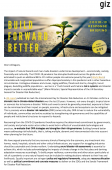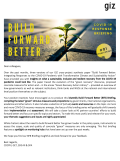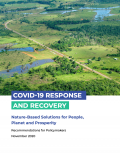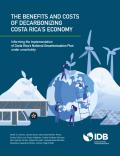
This brief focuses on COVID-19 responses targeted at strengthening risk governance – although comprehensive risk management is (or should be) the very foundation of any “green” stimulus measure and proposition by governments, multilateral organisations, academia, civil society, and other actors at the national and international level in order to achieve a sustainable, inclusive, and resilient recovery from the pandemic. The compilation shows that, to date, it is mainly international and civil society organisations pointing out the link to DRR, but some governments are highlighting the necessity to strengthen their risk governance to build forward better and prepare themselves for future shocks.

As more COVID-19 recovery measures emerge and rhetoric about the need to build forward better grows louder in the policy space, instruments to assess the scope, scale and quality of concrete “green” measures are only emerging. This first briefing features a spotlight on monitoring hubs that have been set up, including the Energy Policy Tracker, Green Stimulus Index, IMF Policy Tracker, OECD Country Policy Tracker, Carbon Brief green recovery measures tracker, and the World Bank's COVID-19 data hub.
To better understand the situation, this document provided by the Food and Agriculture Organization of the United Nations (FAO) has been closely monitoring local food system status and prevailing practices during COVID-19, collecting information and insights from different cities on key challenges and specific responses through various channels.

This report offers recommendations to policymakers to meet the challenge of achieving an equitable carbon-neutral, nature-positive economic recovery and a sustainable future.

This report developed an integrated model that estimates the benefits and costs of implementing the decarbonization plan in all major sectors, informed by consultations with numerous government agencies, industries and non-governmental organizations.
